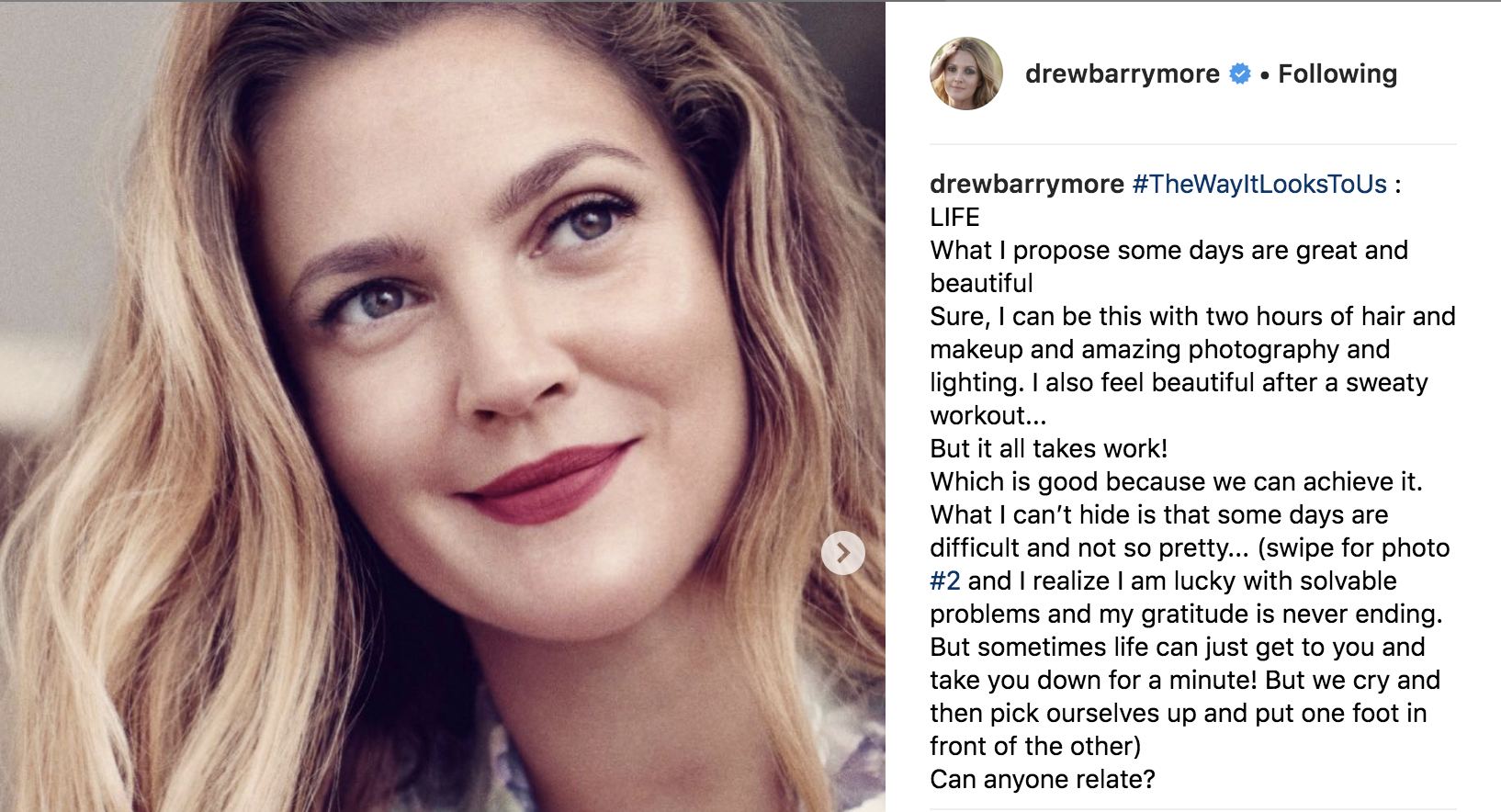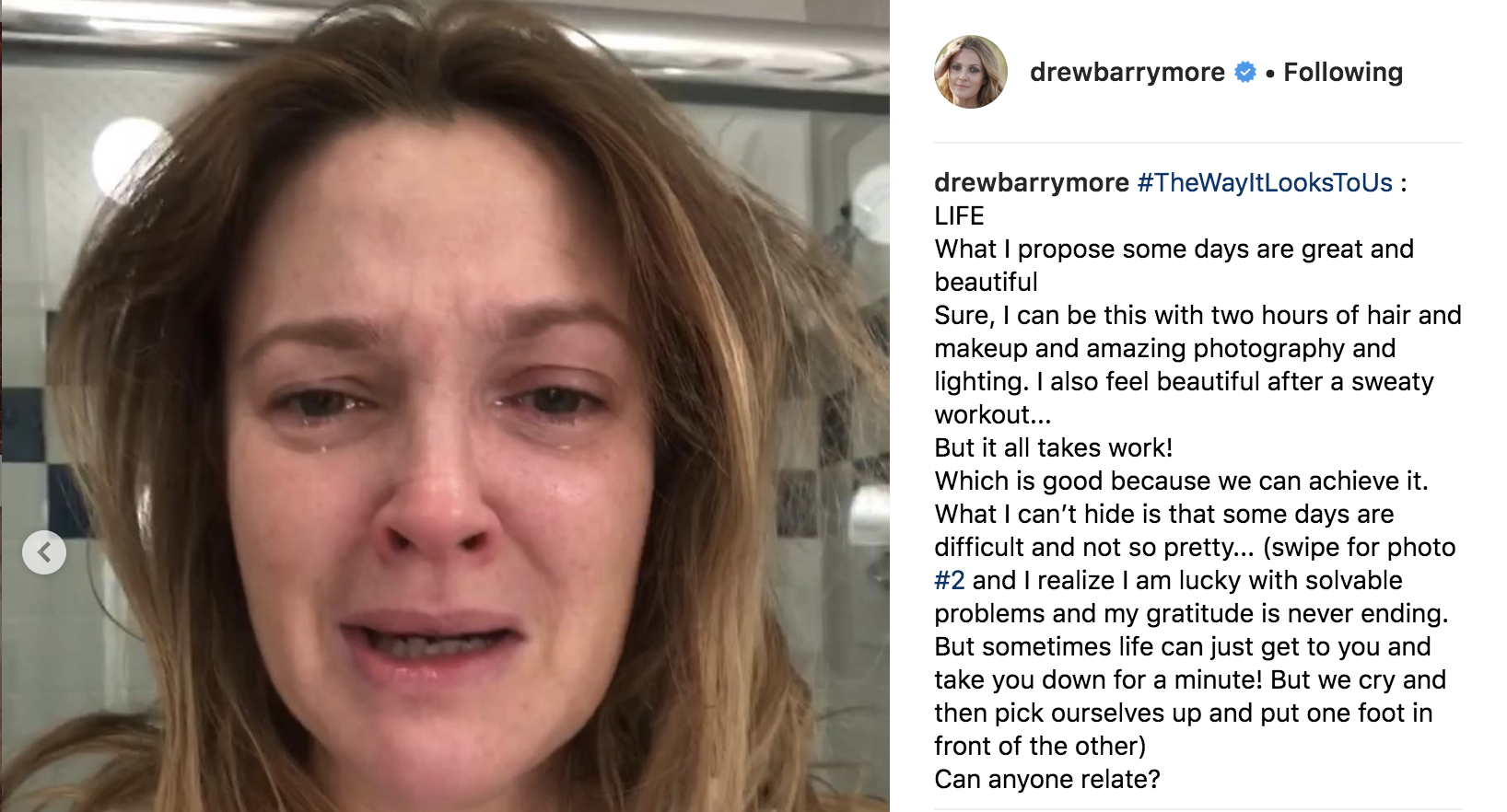It’s usually our happiest moments that we share on social media. But Drew Barrymore made an exception when she posted a selfie of herself crying with a caption that sparked conversation about mental health.
Posting two photos — one of herself perfectly made up and smiling, and one with no makeup and tears — Barrymore took the opportunity to point out that no one, not even stars like herself, are immune to bad days. “What I propose some days are great and beautiful,” she wrote, pointing out the difference between the two photos. “Sure, I can be this with two hours of hair and makeup and amazing photography and lighting. I also feel beautiful after a sweaty workout… But it all takes work! Which is good because we can achieve it.”
She then took a moment to encourage her followers to be open about their own tough moments and embrace their vulnerability, which is something her fellow celebrities have made a habit of doing lately, such as Demi Lovato and Pete Davidson — who have let their followers in on their emotional journeys — and the Half the Story movement, which is a push for emotional transparency on social media. “What I can’t hide is that some days are difficult and not so pretty,” she wrote.” I realize I am lucky with solvable problems and my gratitude is never ending. But sometimes life can just get to you and take you down for a minute! But we cry and then pick ourselves up and put one foot in front of the other. Can anyone relate?”


Judging by the more than half a million likes amassed within a day — and the seemingly endless stream of comments — many can, indeed, relate. That’s in part because there is a scientific basis to sharing your vulnerability and writing about it as Barrymore did.
When we face life’s inevitable challenges and stressors there is tremendous value in not holding them inside, Tim Bono, Ph.D., a lecturer in Psychology at Washington University in St. Louis and author of When Likes Aren’t Enough: A Crash Course in the Science of Happiness, tells Thrive. “Left to their own devices, negative emotions can easily turn into vicious thinking cycles, which often lead us to blow things out of proportion. Negative emotions like anxiety and sadness can also interfere with our capacity for rational thought,” Bono says.
Bono says the act of writing about your bad day also helps you let go of it. “Even if we don’t have someone immediately available to talk to, there are also benefits involved with journaling or writing out our feelings. The act of translating our emotions into language — whether through writing or talking, and in whatever way feels comfortable — can be a powerful way to gain a more well-reasoned, rational perspective to the situation we are facing, minimizing the negative toll it could otherwise take and positioning us to move on more quickly.”
However, talking about your anxiety and sadness to someone you trust is usually much more effective than posting about it on social media, says Bono. “So much of our ability to communicate our emotions has to do with non-verbals such as our facial expression, body posture, tone of voice, or the pacing and timing of our speech patterns. All of that is lost on social media,” he says, adding, “If you want to disclose great detail about your situation, I believe it is far more valuable and productive to reach out to someone you have a personal relationship with and speak with them on the phone or better yet, face-to-face.”
That said, sourcing support on social media can be helpful. “I’ve seen some people post messages like, ‘having a rough day, please post pictures of cute pets or kids,’ and then the flood of endearing images in the comments section provides a pick me up for anyone who views it,” Bono explains. “I think that is a great way to get a quick mood booster.”
Follow us here and subscribe here for all the latest news on how you can keep Thriving.
Stay up to date or catch-up on all our podcasts with Arianna Huffington here.



